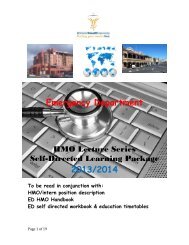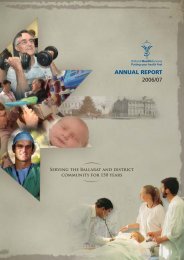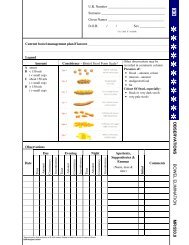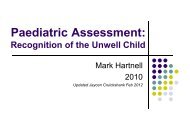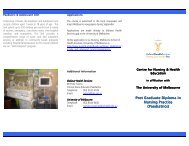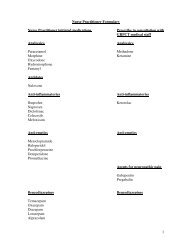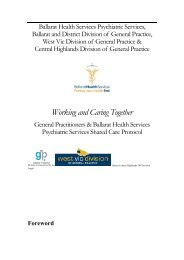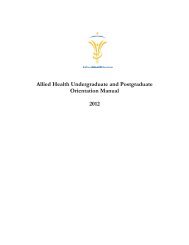WHAT IS ANXIETY? - Ballarat Health Services
WHAT IS ANXIETY? - Ballarat Health Services
WHAT IS ANXIETY? - Ballarat Health Services
You also want an ePaper? Increase the reach of your titles
YUMPU automatically turns print PDFs into web optimized ePapers that Google loves.
<strong>WHAT</strong> <strong>IS</strong> <strong>ANXIETY</strong>?I: An Overview<strong>Ballarat</strong><strong>Health</strong><strong>Services</strong>Produced by <strong>Ballarat</strong> <strong>Health</strong> <strong>Services</strong>,Psychiatric <strong>Services</strong>First Published 1988, Revised 1997:© Optimal Treatment Project 1997
Anxiety : page 3see that we do not have any straightforward medical problems that might be making ournervous system extra-sensitive, and lead to anxiety or other disorders.PEOPLE WITH EXTRA-SENSITIVENERVOUS SYSTEMS HAVE FEAR REACTIONSIN EVERYDAY UNPLEASANT SITUATIONSWhat are the Usual Situations that Trigger Anxiety Attacksa) Unpleasant SituationsWe have noted that some unpleasant situations or things may trigger full-blown fearreactions in some people. Enclosed spaces, crowds, heights, flying in aeroplanes, injectionsand blood, spiders, aggressive animals or insects, dirty hands or kitchens are oftenconsidered unpleasant by most of us. However, the person who is prone to anxiety attacksmay find that one or more of these things almost always triggers a full anxiety attack forthem.b) Distressing MemoriesSome people have anxiety attacks in situations that remind them of extremely frighteningevents that they have experienced in the past. These may be such as being in a combat zonein a war, or being physically or sexually assaulted. Often the reminders of such events mayseem very trivial -- a noise, a comment, or a gesture.c) Odd Bodily SensationsOther people may notice every little change in the way their body works, such as a missedheart-beat or a feeling of light-headedness. These changes may set off worrying thoughts ofhaving a heart attack or a serious illness. The fact that their doctor tells them that there isnothing seriously wrong may not reassure them, particularly if the unpleasant sensationcontinues.In almost all cases some situations or thoughts can be found to trigger off full-blown attacksof fear or panic. Once it occurs the feeling is so terrifying that most of us want to escapefrom the situation as quickly as possible, and to avoid any possible chance of it happeningagain. The reactions of the body and mind cause us to think that we are about to die of aheart attack, or that we will lose control and go berserk. Neither is likely to occur. Inalmost every case the anxiety gradually goes away in a short while.MOST PEOPLE TRY TO ESCAPEFROM FRIGHTENING SITUATIONS& TO AVOID THEM IN FUTURE
Anxiety : page 4<strong>WHAT</strong> SITUATIONS SET OFF <strong>ANXIETY</strong> ATTACKS FOR US?________________________________________________________________________________________________________________________________________________________<strong>WHAT</strong> DO WE DO WHEN WE HAVE AN <strong>ANXIETY</strong> ATTACK?________________________________________________________________________________________________________________________________________________________What is a Panic Attack?A severe attack of anxiety is called a “panic attack”. It may help to know a little bit aboutthe sensations that we may experience during a panic attack, so that we can see that theyare directly caused by our anxiety and not the other way around. It is usual that thesefeelings will pass quite quickly, depending on how frightened we feel, and as soon as we canget our body to react normally again. The main features of a panic attack are:a) the unusual bodily sensationsb) frightening thoughts about these sensations.Unusual Bodily SensationsHere is a list of some of the things we might feel:* light-headed* dizzy* confused* breathless* tightness or pains in our chest* fuzzy sight* feeling that things are not real* fast heart beat or skipping beats* numb or tingly feeling* cold hands and feet* sweating* stiff muscles* headaches* twitching muscles<strong>WHAT</strong> ODD SENSATIONS DO WE HAVE WHEN WE HAVE A PANIC ATTACK?________________________________________________________________________________________________________________________________________________________
Anxiety : page 5Most of these unpleasant sensations seem to result from breathing too strongly. Even thoughwe are taking in more air, changes in our body chemistry means that less oxygen is gets tomany parts of our body. We may recall that breathing rapidly was one feature of the normal“fight or flight” response to fear. Breathing more rapidly or more deeply than we need upsetsour body chemistry and we get these unpleasant effects.The feelings of dizziness and light-headedness, unreality, shortness of breath and tinglingfingers or feet are a direct result of the oxygen shortage that we produce. Other symptomsproduced during a panic attack result from the `fight or flight' response itself or from theexertion of breathing too strongly (feeling hot and sweaty, tiredness or exhaustion, sorechest muscles).Frightening ThoughtsAs well as sometimes setting off panic attacks frightening thoughts make us feel worse whenwe are experiencing an attack. Some of the most common thoughts people have when theyare having a panic attack are, “Am I going mad?” or “I’m going to lose control or do somethingto embarrass myself” or even “I’m having a heart attack and am going to die”.<strong>WHAT</strong> FRIGHTENING THOUGHTS DO WE HAVE WHEN WE HAVE A PANICATTACK?________________________________________________________________________________________________________________________________________________________All of these fears are also quite normal if we experience a very bad attack of anxiety withmany unusual and unpleasant bodily sensations. Unfortunately these frightening thoughtsalso add to our anxiety reaction, making it worse and last longer.I am going mad!A panic attack is a very frightening experience and the unpleasant thoughts we have mayconvince us that we are losing our mind. It may be a relief to know that as many as 20% of alladults have a panic attack at some time in their life. Because we have a panic attack it doesnot mean that there is anything else wrong with us, or that the fearful feelings are going tolast forever. Most people feel very frightened but the feelings do pass and don’t do us anypermanent harm.I am losing control!Another common fear is that we might lose control and do something crazy or embarrassourselves by screaming or collapsing. These fears may in fact make us feel even morefrightened and make the panicky feelings last for longer. What is important to remember isthe way we have coped with the fear in the past. Even though we may not have felt in totalcontrol we probably behaved in a very controlled way, perhaps by simply leaving the situationquickly, or sitting down when we started to fell dizzy and afraid. We are likely to act inexactly the same way again if we have another panic attack and are very unlikely to losecontrol and act in a bizarre way.
Anxiety : page 6I am having a heart attack!If we have experienced chest pains when we have felt afraid it is likely to be because ourchest muscles have become tight and sore from overbreathing. Many people experiencetightness in their chests and this will usually pass. However if the pain and discomfort lastslong after the anxiety has passed it may be worth being checked by a doctor.Avoiding Situations that Make Us AnxiousWe quickly learn to avoid those situations and things that are extremely distressing. Thistends to include situations in which we have had a panic attack or those places or things thatwe think might trigger a panic attack.Anxiety disorders are classified according to those situations that each person tends toassociate with the triggers to their attacks. People with agoraphobia (in Greek, means "fearof the market place") will tend to avoid situations outside their homes, such as supermarkets,shops, buses and trains, from which there is no easy escape or help available if a panic attackoccurs. Those with social phobia will tend to avoid any situation where they think their socialbehaviour may be criticised by others, and they may feel embarrassed. A person with aspider phobia will avoid anywhere they think that a spider may be lurking. A person withpost-traumatic stress disorder will try to avoid anything that reminds him or her of thefrightening event they experienced. And some people will not have any specific triggers totheir panic attacks or may feel high levels of anxiety throughout the day (generalisedanxiety disorder).<strong>WHAT</strong> SITUATIONS OR THOUGHTS DO WE TRY TO AVOID?________________________________________________________________________________________________________________________________________________________Avoiding those situations that set off attacks of anxiety will prevent those attacks, at leastfor a while. However, in the long run we usually find that we need to avoid more and moresituations and our lives become more and more restricted. In order to avoid things that mightmake us anxious we may need to change our entire lifestyles. Even our families and friendsmay need to adjustments to help us to cope in this way, often reducing the quality of theirlives as well. As a result, sometimes our efforts to cope with anxiety may be a biggerhandicap than the anxiety itself.OUR EFFORTS TO COPE BY AVOIDING THINGSMAY RESTRICT OUR LIFESTYLESAS WELL AS THOSE OF OUR FRIENDS AND FAMILIES<strong>WHAT</strong> STRATEGIES HAVE WE USED TO COPE WITH <strong>ANXIETY</strong> SYMPTOMS?________________________________________________________________________________________________________________________________________________________
Anxiety : page 7Anxiety and StressStresses in our lives may trigger off anxiety attacks, or make them worse. There are twokinds of stress that effect us. First, the stress of everyday living -- our homes, our friends,our work, and the community in which we live may produce difficulties. Some of thesedifficulties may be clearly very stressful, such as not having a place to live or any money orworthwhile things to do. But the many little problems that we may have may all add up to avery stressful life situation. Unpleasant events, such as a death in the family, or loss of a job,or break up with a close friendship, are usually very stressful. But even some pleasant things,like getting married, starting a new job, having a baby, or even going on a vacation, can bevery stressful for some people, particularly if they do not plan to deal with any difficultiesthat might arise.Sometimes it is difficult to tell the difference between out reactions to stress and thesymptoms of anxiety, especially of the more general kind. Stress produces many similardifficulties with muscle tension, rapid heart beat, shakiness, and sometimes over-breathing.The problems of getting off to sleep, restlessness and irritability may all occur in anxiety aswell as stress.Problem AnalysisIn order to get a better idea about the things that make these problems better orworse, our Instructor will ask X__________ some questions about it using theProblem Analysis Worksheet. This will take 15-20 minutes. We can all stay andlisten, but we may have other things that we would rather be doing at this time.Feedback to all group members(after the Problem Analysis worksheet has been filled in and key points notedon the list below)We have had a good discussion about the problem that X________ has been having.Some of the points that we felt might be helpful in finding new ways to solve thisproblem were:____________________________________________________________________________________________________________________________________________________________________________________________________________________________________________________________Are there any other points that anybody would like to add to these?______________________________________________________________________________________________________________________________
Anxiety : page 8Keeping a record of times when we feel anxiousOne of the first things we need to do is find out more about what might trigger ouranxious feelings. Let's look at the Anxiety Record worksheet below. This recordallows us to note exactly when we have felt anxious and what things might be linked toour feelings of anxiety, and what we did to cope with our anxiety.Of course there may be times when we feel anxious more than once in each hour, orwhere we are unsure of the exact time or length of time when we started to feelanxious. We do not need to worry too much about this, just write down what we can inthe spaces. Our family and friends can help us with any problems. They may also be ableto help to identify things that seem to set off our anxiety.It is usually easiest to keep a record as we go each day. So it is useful to carry thesheet around and note down how we are feeling right away.Practice filling in the Anxiety Record sheetWe can start by filling in any times when we have felt anxious today, from the time whenwe woke up until now. This should help us to get an idea of how the sheet works and wecan help to sort out any confusion.Severity of Anxiety:anxiety record0 = none 1 = almost none 2 = v.mild 3 = mild 4 = mild-moderate 5 = moderate 6 = mod-severe 7 = severe 8 = v.severe 9 = v.v.severe10 = extremeTIMELOCATIONWhere wasI when theanxietystarted?ACTIVITYWhat wasI doing?FEELINGSWhat weremy feelings?THOUGHTSWhat was Ithinking?<strong>WHAT</strong><strong>ANXIETY</strong>SIGNSDID I HAVE?How strong werethey? (0 -10)<strong>WHAT</strong> DID IDO?Note all myreactions to theanxiety,“good” as well as“bad”.<strong>WHAT</strong> WASTHEOUTCOME?Severity? (0-10)Time it took to getbetter?DO WE HAVE ANY QUESTIONS ABOUT MAKING A RECORD OF OURANXIOUS FEELINGS?Review of Anxiety Record sheetAt the start of our next teaching session we will look over the records that we havemade and see what we can learn more about our anxiety problems and find other waysto help us cope with them.
DEVELOPINGSTRATEGIES TO COPEWITH <strong>ANXIETY</strong>?II: REDUCING THE SENSITIVITYOF OUR NERVOUS SYSTEM<strong>Ballarat</strong><strong>Health</strong><strong>Services</strong>Produced by <strong>Ballarat</strong> <strong>Health</strong> <strong>Services</strong>,Psychiatric <strong>Services</strong>First Published 1988, Revised 1997:© Optimal Treatment Project 1997
Anxiety : Relaxing page 10In our last session we talked about the nature of anxiety. We discussed how it is anexaggerated fear reaction set off by situations and things that are not really dangerous.People who develop anxiety problems seem to have an extra-sensitive nervous system. Oncetheir nervous system begins to react excessively to some unpleasant situation this maybecome worse if they breathe too fast and begin to think frightening thoughts about whatmight be happening to them.<strong>ANXIETY</strong> <strong>IS</strong> AN EXCESSIVE FEAR RESPONSETHAT <strong>IS</strong> MADE WORSE BYBREATHING TOO STRONGLY,FRIGHTENING THOUGHTSAND BY AVOIDING SITUATIONSTHAT SEEM TO TRIGGER OUR FEARSDO WE HAVE ANY QUESTIONS ABOUT THE NATURE OF <strong>ANXIETY</strong>?Review of Daily Anxiety RecordLet us review the records that we have made on the Anxiety Record worksheets thisweek. Now that we have this record we may be able to see more clearly the pattern ofour anxiety as well as things that may make it better or worse.<strong>WHAT</strong> CAN WE NOTICE ABOUT OUR <strong>ANXIETY</strong> FROM THE WORKSHEET?CAN WE SEE ANY THINGS THAT MIGHT TRIGGER OFF OUR <strong>ANXIETY</strong>?________________________________________________________________________________________________________________________________________________________________________________________________________________________WHICH REACTIONS SEEMED TO MAKE THE <strong>ANXIETY</strong> BETTER OR WORSE?________________________________________________________________________________________________________________________________________________The Treatment Strategies for Anxiety DisordersWe will now consider some of the treatment strategies for anxiety help us to deal with eachof the factors that we discussed earlier.1. First, we can try to correct any bodily abnormalities that may make our nervoussystem extra-sensitive. This includes finding ways to relax our bodies, and tobreathe naturally.2. If we have frightening thoughts, we look for ways to think more realistically.3. If specific situations set off our fear responses, we try to get used to thesesituations so that they become less likely to set off fear reactions.
Anxiety : Relaxing page 114. If worrying thoughts and stress make us anxious in many everyday situations, we lookat ways to solve the problems in a way that reduces stress and worry.a) Treatment for Medical ProblemsReducing the Sensitivity of the Nervous Systemand Controlling Physical Sensations of AnxietyOften a medical problem makes our nervous systems extra-sensitive. This can be correctedby specific treatments, such as correction of an overactive thyroid state, or change ofmedication for asthma. It is important to have a thorough medical check-up from a doctor tomake sure these conditions are corrected.HAVE WE HAD A CHECK UP FROM OUR DOCTOR TO BE SURE OUR <strong>ANXIETY</strong> <strong>IS</strong>NOT CAUSED BY GENERAL MEDICAL PROBLEMS?IF WE HAVE NOT HAD A CHECK UP, WHEN DO WE PLAN TO ARRANGE ONE?_____________________________________________________________________b) Reduce Stimulant IntakeA slight excess of caffeine intake in the form of coffee, tea or drinks containing caffeine,such as cola drinks, may make anxiety attacks more frequent. It is a good idea to cut down onthese drinks for a week or two to see if we notice any difference. To notice any benefits wewill need to reduce this to less than 5 small drinks per day, probably only 1 or 2.Stronger stimulant drugs like ecstasy, cocaine or amphetamines often provoke anxietyreactions in people who risk their use. They should not be taken by anyone who has anxiety orany other mental or physical symptoms.DO WE DRINK MORE THAN 5 SMALL CUPS/GLASSES OF TEA, COFFEE OR COCACOLA EACH DAY? HOW COULD WE REDUCE TH<strong>IS</strong>?______________________________________________________________________________________________________________________________________________________________________________________________________________________c) Muscle RelaxationTwice daily muscle relaxation exercises help lower general levels of tension, and reduce ourrisk of attacks of panic and anxiety. Regular relaxation will also relieve muscle tension thatmay cause headaches, backaches, joint and chest pains, as well as general tiredness andlethargy. Here is a way to relax by gradually tensing then relaxing the various groups ofmuscles in a simple way:
Anxiety : Relaxing page 121. Sit or lie comfortably. Loosen tight clothing. Close our eyes and breatheslowly.2. Begin a series of tensing and then relaxing exercises starting with ourfeet. Gradually tense each muscle group in turn, counting to 5. Thenrelease the tension slowly. Each exercise is repeated before moving on tothe next group.Feet:Calf muscles:Thighs:Stomach:Chest/back:Shoulders:Neck:Face:Eyes:Forehead:Upper arms:Forearms:Hands:Curl our feet and toes upPoint our feet and toes downStraighten our legs and lift them off the groundSuck in our stomach muscles under our rib cageTake a deep breath, hold it, then force our chest toexpandPush our shoulders forward; then push our shouldersbackPush our chin down onto our chest; push our headbackwardsClench our teeth and stretch our mouth in anexaggerated smileScrew our eyes up tightlyRaise our eyebrows; frown, wrinkling our foreheadPush our knuckles back onto our shouldersBend our hands back at right angles to our armsClench our fists tightly; then, spread our fingers apart3. Once all the muscle groups have been relaxed in this manner, focus on howour body feels. Try to detect any part of our body that still feels tense.Repeat the tensing/relaxing routine for these parts until all our musclesfeel heavy and relaxed.4. Now our muscles are relaxed, take slow, shallow breaths in and then out,counting to 3 as we breathe in, then to 3 as we breathe out. Instead ofcounting when we breathe out whisper the words "relax" or "calm".5. The whole process usually takes 20 minutes, after which we can stretch,open our eyes and slowly get up.
Anxiety : Relaxing page 13HAVE WE TRIED ANY RELAXATION STRATEGIES LIKE THESE BEFORE?WERE THEY HELPFUL?WERE THERE ANY REASONS WHY THEY MIGHT NOT HAVE HELPED VERY MUCH?____________________________________________________________________________Practice in the Session:Let's practise Muscle Relaxation. First we will practise using the relaxation strategywhile sitting comfortably. Our Instructor will read the instructions and we will try tofollow them.Feedback after the Practice:<strong>WHAT</strong> DID WE LIKE ABOUT PRACT<strong>IS</strong>ING MUSCLE RELAXATION?_________________________________________________________________<strong>WHAT</strong> PROBLEMS DID WE HAVE TRYING TO USE IT?_________________________________________________________________<strong>WHAT</strong> COULD WE DO DIFFERENTLY IN FUTURE THAT MIGHT MAKE IT WORKBETTER?__________________________________________________________________________________________________________________________________Real Life PracticeIt is important for us to realise that muscle relaxation is a skill that can be learnt onlywith much practice. It is unusual to notice much benefit until we have practised it forat least a week or two. The coaching from our Instructor, as well as dailyencouragement from a close friend or family member is usually crucial in the initialstages of learning this skill.d) Slow Controlled BreathingMost people breathe too fast and too strongly when they are anxious, particularly when apanic attack is developing. Learning to breathe more naturally when we are tense will help toreduce the sensations that often seem to trigger off our panic attacks and anxiety.Other people have a habit of always breathing too strongly. This makes their nervoussystems extra-sensitive much of the time. Learning to control our breathing may help reducethe sensitivity of our nervous systems as well as helping calm us when we begin to feelanxious.HAVE WE NOTICED THAT WE BREATHE MORE QUICKLY AND MORE DEEPLYWHEN WE ARE TENSE AND ANXIOUS?
Anxiety : Relaxing page 14If we have a tendency to over-breathe here is a simple strategy that may help. It should bepractised at least twice every day, as well as at the first signs of panic or anxiety.Controlled Breathing1. Whenever we recognise the first signs of over-breathing (lightheadedness,being out of breath, heart racing, cold hands and feet)stop what we are doing and sit down or lean against something. If weare driving, pull over and park in a safe place.2. Without taking a deep breath, hold our breath for 5 seconds --counting slowly to five.3. When we get to 5, breathe out and say the words "relax" or "calm"to ourselves in a soothing way.4. Breathe in and out smoothly in a six-second rhythm. Breathe in forabout 3 seconds and then out for about 3 seconds. This will produce abreathing rate of about 10 breaths per minute.Say the words "relax" or "calm" every time we breathe out.5. Continue to breathe in this way for at least 5 minutes or until all of oursigns of over-breathing have gone.Practice in the Session:Let’s practise Controlled Breathing now. We will start by breathing in an exaggeratedway for 30 seconds. As soon as we begin to feel any unusual sensations or feelings ofanxiety, we can try to follow the steps on the Controlled Breathing worksheet.Feedback after the Practice:<strong>WHAT</strong> DID WE LIKE ABOUT PRACT<strong>IS</strong>ING CONTROLLED BREATHING?_________________________________________________________________<strong>WHAT</strong> PROBLEMS DID WE HAVE TRYING TO USE IT?_________________________________________________________________<strong>WHAT</strong> COULD WE DO DIFFERENTLY IN FUTURE TO MAKE IT WORK BETTER?___________________________________________________________________________________________________________________________________________________________________________________________________
Anxiety : Relaxing page 15Real Life PracticeIt is important for us to realise that controlled breathing may seem simple, butrequires a lot of practice. It is unusual to notice much benefit until we have practised itfor at least a week or two. The coaching from our Instructor, as well as dailyencouragement from a close friend or family member is usually crucial in the initialstages of learning this skill.e) Anti-Anxiety MedicationsA simple way to reduce the sensitivity of our nervous system is to take a tranquillisingmedicine. There are several kinds to choose from that may be especially helpful if we havevery severe anxiety that continues throughout the day and is not reduced much by our bestefforts to relax or to use the other self-help strategies.Unfortunately, while some of the medicines work very well at reducing the sensitivity of ournervous system, they do not merely reduce attacks of anxiety, but tend to make ustranquillised at all times. This may reduce our ability to feel excited and happy, to reactquickly to emergencies, to think clearly and solve problems. So it is usually best to save thesemedicines for emergency use, when we have periods when our anxiety is out of control, whenwe cannot sleep and feel in a constant state of panic.• Benzodiazepines (diazepam, temazepam, alprazolam), are useful for severeanxiety attacks. However, these drugs tend to suppress our natural responsesand seldom assist in overcoming the problems in the long term. If relied on toomuch, these medicines may delay the natural reduction of our anxiety levels andslow our progress. If we take this medicine for more than a few weeks at atime we may develop some unpleasant reactions when we try to stop taking it.Doctors usually recommend that we take these medicines for no more than 4weeks in any course of treatment.• Tricyclics (imimpramine, chlomipramine), MAOIs (phenelzine, meclobamide) andSSRIs (fluoxetine, fluvoxamine, sertraline, paroxetine) have similar antianxietybenefits to benzodiazepines, but with different side effects. Onceagain, short courses of carefully supervised treatment that minimise the sideeffects are most effective.These medicines have the additional advantage of having antidepressanteffects. Many people who have disabling anxiety disorders will have periodswhen they feel depressed. This depression may be helped by these medicines.• Alcohol or marijuana have similar effects to benzodiazepine medicines. Manypeople with anxiety problems use these drugs to cope with their difficulties. Asa result they may become dependent on these drugs and need special treatmentto deal with this. Depending on such drugs to cope with anxiety is a type ofavoidance, and is not usually the best long-term solution.
Anxiety : Relaxing page 16<strong>WHAT</strong> MEDICATIONS OR OTHER DRUGS HAVE WE FOUND HELPFUL IN REDUCINGTHE SENSITIVITY OF OUR NERVOUS SYSTEMS?____________________________________________________________________________________________________________________________________________________________________________________________________________________________________Developing a Plan for Reducing the Sensitivity of our Nervous SystemsNow that we have explored some of the strategies that people have found useful in reducingthe sensitivity of their nervous systems we can make a plan to apply one of them in the nextweek. We can use the Structured Problem Solving method to help us work out the best planat this point. We must not forget that as well as the strategies that we have discussedtoday, that we may have been using other strategies that seem to work well for us. So weshould look back over the Problem Analysis and Anxiety Record to see if there are any ofour own ideas that we should try and develop first.Plan For Reducing the Sensitivity of My Nervous System____________________________________________________________________________________________________________________________________________________________________________________________________________________________________________________________________________________________________________________________________Keeping a record of times when we feel anxiousThroughout this week we will continue to make notes about our anxiety feelings. The AnxietyRecord will show us when we have felt anxious. It will also help us to see how much thestrategies we have tried have made a difference to the severity of our anxiety problems, aswell as any problems that we may have trying to use them. Do not expect too much for thisfirst week as it will usually take much longer before we notice any big benefits from thesestrategies.
Anxiety : Relaxing page 17progressive muscle relaxation1. Sit or lie comfortably. Loosen tight clothing. Close our eyes and breathe slowly.2. Begin a series of tensing and then relaxing exercises starting with our feet.Gradually tense each muscle group in turn, counting to 5.Then release the tension slowly.Each exercise is repeated before moving on to the next group.Feet:Curl our feet and toes upCalf muscles: Point our feet and toes downThighs:Stomach:Chest/back:Shoulders:Neck:Face:Eyes:Forehead:Upper arms:Forearms:Hands:Straighten our legs and lift them off the groundSuck in our stomach muscles under our rib cageTake a deep breath, hold it, force our chest to expandPush our shoulders forward; then push our shoulders backPush our chin down onto our chest; push our head backwardsClench our teeth and stretch our mouth in an exaggerated smileScrew our eyes up tightlyRaise our eyebrows; frown, wrinkling our foreheadPush our knuckles back onto our shouldersBend our hands back at right angles to our armsClench our fists tightly; then, spread our fingers apart3. Once all the muscle groups have been relaxed in this manner focus on how our body feels.Try to detect any part of our body that is still feeling tense.Repeat the tensing/relaxing routine for these parts until all our muscles feel heavyand relaxed.4. Now our muscles are relaxed, take slow, shallow breaths in and then out,counting to 3 as we breathe in, then to 3 as we breathe out.Instead of counting as we breathe out, we can whisper the word "relax" or "calm".5. The whole process usually takes 20 minutes, after which we can stretch, open our eyesand slowly get up.
Anxiety : Relaxing page 18slow controlled breathing1. Whenever we recognise the first signs of over-breathing (lightheadedness,being out of breath, heart racing, cold hands and feet)stop what we are doing and sit down or lean against something. If weare driving, pull over and park in a safe place.2. Without taking a deep breath, hold our breath for 5 seconds --count slowly to five.3. When we get to 5, breathe out and say the word "relax" or "calm" ina soothing way.4. Breathe in and out smoothly in a six-second rhythm. Breathe in forabout 3 seconds and out for about 3 seconds. This will produce abreathing rate of about 10 breaths per minute. Say the word "relax"or "calm" every time we breathe out.5. Continue to breathe in this way for at least 5 minutes or until all ofour signs of over-breathing have gone.
DEVELOPINGSTRATEGIES TO COPEWITH <strong>ANXIETY</strong>?III: REDUCING FRIGHTENINGTHOUGHTS<strong>Ballarat</strong><strong>Health</strong><strong>Services</strong>Produced by <strong>Ballarat</strong> <strong>Health</strong> <strong>Services</strong>,Psychiatric <strong>Services</strong>First Published 1988, Revised 1997:© Optimal Treatment Project 1997
Anxiety: Frightening Thoughts page 20In our last session we talked about the ways to reduce the sensitivity of our nervous systemsso that we are less prone to become anxious in situations that are not really dangerous. Onceour nervous system begins to react to some unpleasant situation this may become worse if webreathe too fast and begin to think frightening thoughts about what might be happening tous.<strong>ANXIETY</strong> <strong>IS</strong> AN EXCESSIVE FEAR RESPONSETHAT <strong>IS</strong> MADE WORSE BYOVER-BREATHING,FRIGHTENING THOUGHTSAND COPING BY AVOIDING SITUATIONSTHAT SEEM TO TRIGGER THE FEARReview of Daily Anxiety RecordLet's review the Anxiety Records we completed this week. Now that we have thisrecord we may be able to see more clearly the pattern of our anxiety as well as thingsthat may have made it better or worse. This past week we were applying a plan to try toreduce the sensitivity of our nervous system.<strong>WHAT</strong> SMALL CHANGES HAVE WE NOTED AS A RESULT OF USING THE PLAN?______________________________________________________________________________________________________________________________<strong>WHAT</strong> CHANGES MIGHT WE NEED TO MAKE IN THE PLAN OR OUR EFFORTSTO GET MORE BENEFITS?______________________________________________________________________________________________________________________________Coping with Frightening ThoughtsWorrying and upsetting thoughts about certain events or situations may trigger anxietyattacks. They also make the attacks worse. The way in which we think about any particularthing will affect the way we feel about it. For example, if we think that the sensationscreated by a panic attack mean that we are about to die or go berserk, then it is notsurprising that we will feel even more anxious. However, if we view the sensations as “veryunpleasant, but relatively normal bodily responses" rather than "terrifying and probablyfatal", then we may not feel so anxious and distressed.We can set off anxiety by thinking that we may have a panic attack in a situation where itwould be extremely embarrassing, or where it would be difficult to escape (such as in acrowded supermarket or on a bus), or where no help is near (such as alone at home or on alonely road).
Anxiety: Frightening Thoughts page 21We may worry that we will appear stupid when we are speaking or doing something in front ofother people, even people who don't know us and are not important. We may convinceourselves that people will think badly of us, and they will never want to be our friends. Wemay feel this way even when our friends and family tell us that we are doing fine.Most of us notice aches and pains and occasional odd sensations in our bodies, but think littleof them, unless the problem continues, or is one that we have been told to report to ourdoctor as soon as possible. But some anxious people may be sure that the occasionalirregularities of their hearts, lungs or bowels mean that they have a fatal disease that mustbe treated immediately, even after their doctor tells them it is nothing to worry about.These worrying thoughts are not usually a realistic view of things, and reassurance fromfriends and professionals seldom makes them go away. In this session we will look at someother strategies that may help reduce these frightening thoughts.ANXIOUS FEELINGS MAYBE MADE WORSE BYTHE WAY WE THINKThinking More RealisticallyThis strategy aims to change the things we say to ourselves before, during and after we getanxious. We will learn to recognise and challenge our unrealistic, frightening thoughts.a) Recognising frightening thoughtsLet us look at the notes on our Anxiety Records. Can anybody see any frightening thoughts inthe column where we have written down the thoughts we had when we were anxious?FRIGHTENING THOUGHTShow realistic? 0 - 10____________________________________________________________________________________________________________________________________________________________________________________________________________________________________How realistic do we all think these thoughts are? We can try to rate them from 0 to 10. Ascore of 0 means that the thought is absolutely realistic, and 10 means that we think that itis completely unrealistic.Our Anxiety Records may show that very frightening thoughts seem to happen when ouranxiety levels are highest. Of course it is possible that high levels of anxiety lead us to havemore frightening thoughts. But it is also possible that it happens the other way round too --
Anxiety: Frightening Thoughts page 22the more frightening our thoughts, the worse our anxiety becomes. The combination ofanxious feelings and frightening thoughts makes our anxiety spiral out of control.Reducing our Frightening Thoughts?In any situation where we feel anxious, we can ask ourselves the following questions to help usto make a less frightening judgement of the real danger that we are facing:• what do I really fear may happen?• what am I thinking about the people who are looking at me?• what am I saying to myself?Practice in the Session:Let us practice this. We can pick a situation from the Anxiety Record that weremember well. Pick one that did not make us too anxious. Show us exactly what thesituation was like. Try to set this up so that it as realistic as possible.Now try to answer these questions:<strong>WHAT</strong> DO I REALLY FEAR MAY HAPPEN TO ME?_____________________________________________________________________<strong>WHAT</strong> AM I THINKING ABOUT THE PEOPLE WHO ARE LOOKING AT ME?_____________________________________________________________________<strong>WHAT</strong> AM I SAYING TO MYSELF?_____________________________________________________________________Feedback from other Participants<strong>WHAT</strong> DID WE LIKE ABOUT THE WAY X ____________WAS THINKING INTHAT FRIGHTENING SITUATION?__________________________________________________________________________________________________________________________________<strong>WHAT</strong> THOUGHTS MIGHT WE HAVE HAD IF WE WERE IN THE SAMESITUATION?___________________________________________________________________________________________________________________________________________________________________________________________________Now replay the situation and answer a second set of questions:
Anxiety: Frightening Thoughts page 23AM I THINKING REAL<strong>IS</strong>TICALLY ABOUT THE SITUATION?_______________________________________________________________AM I CONSIDERING ALL THE REASONS FOR MY FRIGHTENING THOUGHTS?<strong>WHAT</strong> <strong>IS</strong> THE REAL EVIDENCE FOR MY CONCLUSIONS?_______________________________________________________________AM I THINKING ONLY ABOUT POSSIBLE D<strong>IS</strong>ASTERS?_______________________________________________________________Feedback from other Participants<strong>WHAT</strong> DID WE LIKE ABOUT THE WAY X____________WAS THINKING TH<strong>IS</strong>TIME?_________________________________________________________________<strong>WHAT</strong> OTHER THOUGHTS OCCURRED TO US ABOUT THAT SITUATION?__________________________________________________________________________________________________________________________________________Restructuring our Unrealistic Thoughts:Now we can answer two final questions about the situation.<strong>WHAT</strong> <strong>IS</strong> A MORE TRUE AND ACCURATE VIEW OF THE SITUATION?_______________________________________________________________<strong>WHAT</strong> REALLY <strong>IS</strong> THE WORST THING THAT <strong>IS</strong> LIKELY TO HAPPEN?_______________________________________________________________We may need to repeat these procedures several times before we can begin to change ourthinking about those situations that we find frightening.Thought stoppingA strategy that we may find helpful to reduce their frightening thoughts is called thoughtstopping. If we are overwhelmed by frightening thoughts and just cannot begin to thinkclearly and realistically this strategy may be used. We simply say “stop” very firmly toourselves. If this is not helpful we may find that snapping an elastic band against our wrist togives us a sharp momentary pain stops our frightening thoughts for a second. As soon as wemanaged to stop our frightening thoughts for a second, we try immediately to think aboutsomething completely different, such as a favourite meal or TV programme we are having thatnight, or a planned outing. Even better, if we can read through our list of questions about thesituation that we are experiencing.
Anxiety: Frightening Thoughts page 24Unfortunately this strategy takes much practice before it is useful, and only has temporarybenefits. But it is good to use when we are first getting used to recognising frighteningthoughts and want to try and stop them from making us feel too anxious.Practice:Let's look again at our Anxiety Records and imagine that we are in a situation where wewere moderately anxious. Try and remember the kind of frightening thoughts we had atthat time.When we are having those thoughts again say “stop” firmly to ourselves. Then readthrough the Fighting Fear questions and try to answer them.<strong>WHAT</strong> DID WE NOTICE ABOUT OUR FRIGHTENING THOUGHTS WHEN WETRIED TO STOP THEM IN TH<strong>IS</strong> WAY?________________________________________________________________________________________________________________________
Anxiety: Frightening Thoughts page 25Thought exhaustionSometimes the harder we try to make a thought stop, the more it seems to keep coming back.This can be very frustrating. Fortunately the opposite is sometimes true: the more we try tokeep a thought in our mind, without being distracted in any way the quicker it seems todisappear. It is as if our brain gets exhausted of keeping that thought going. So we cansometimes stop unpleasant thoughts by thinking about that thought really hard. This mayseem quite worrying because our natural inclination is to rid ourselves of frighteningthoughts. But it may be worth a try.Practice:1. Try to think of the worst thing that we can imagine could happen to us when we arevery anxious.2. Now try to keep thinking about this thought and NOTHING ELSE. It may be easiestto close our eyes and concentrate.3. If the thought goes away raise our hand.4. If we begin to get very anxious be sure to practice our controlled breathing andrelaxation.<strong>WHAT</strong> DID WE NOTICE HAPPENING TO OUR FRIGHTENING THOUGHTWHEN WE TRIED TO THINK ONLY ABOUT THAT THOUGHT?_______________________________________________________________Reassuring ThoughtsThere are times we may feel rather frustrated that our progress is slow or we feeloverwhelmed by a particular problem. It is helpful if we learn to talk positively andrealistically to ourselves about our efforts and our achievements, no matter how muchfurther we need to go to cope with all our anxiety problems.<strong>WHAT</strong> STATEMENTS CAN WE USE TO ENCOURAGE OURSELVES?______________________________________________________________________________________________________________________________We can note one or two statements that we like to use to praise ourselves for the efforts wehave made so far in beginning to cope with anxiety. Some people find it useful write thesestatements on a card that they keep with them so that they can use it at anytime they feelthey need encouragement. Whenever we find it difficult to go on, read it several times, untilwe feel that we are able to carry on with our efforts.Reassuring and Encouraging OthersThe skill of giving helpful reassurance to people fighting hard to cope with anxiety is veryimportant. There is a tendency for friends and family members to tell us that we will bealright, or the situation is not as bad as they think, that there is nothing really wrong with us,
Anxiety: Frightening Thoughts page 26so we should not worry. This sort of reassurance seldom provides the support we seek. Amore effective method is to take the time to discuss our progress realistically. All ourefforts, as well as our difficulties. Any real problems can be discussed using the StructuredProblem Solving framework that deals fully with all the issues. This provides the opportunityfor clear action plans, that when implemented, may lead to worthwhile benefits.Friends and family can be an enormous support to the person who is learning to cope withanxiety, particularly when they begin to understand more about the nature of anxiety and itstreatment. Then they can see more clearly the efforts that need to be made to live with thisdisorder. This makes it much easier to give genuine praise and encouragement, not merelywarm, but rather empty reassuring comments.Developing a Plan for Coping with Frightening ThoughtsNow that we have explored some of the strategies that people have found useful in copingwith frightening thoughts. We can make a plan to apply one or more of these strategies in thenext week. We can use the Structured Problem Solving method to help us work out the bestplan at this point. We must not forget that as well as the strategies that we have discussedtoday, that we may already have been using other strategies that seem to work well for us.So we should look back over the Problem Analysis and Anxiety Record to see if there are anyof our own ideas that we should try and develop first.Plan For Coping with Frightening Thoughts____________________________________________________________________________________________________________________________________________________________________________________________________________________________________________________________________________________________________________________________________________________________________________________________________________________________________________________________________________________________________________________________________________________________________________________________________________________________________________________________________________________
Anxiety: Frightening Thoughts page 27Keeping a record of times when we feel anxiousWe will continue to make a note of our anxiety feelings this week. The Anxiety Record willshow us when we have felt anxious. It will also help us to see how much the strategies wehave planned reduce the anxiety problems, as well as any problems that we may have trying touse them.
Anxiety: Frightening Thoughts page 28fighting fearwhat do I think about the situation?_______________________________________________________what do I really fear may happen?_______________________________________________________what am I saying to myself?______________________________________________________________________________________________________________am I being realistic about the situation?_______________________________________________________am I considering all the reasons for my frightening thoughts?what is the real evidence for my conclusions?_____________________________________________________________________________________________________________________________________________________________________am I thinking only about possible disasters?_______________________________________________________what is a more true and accurate view of the situation?______________________________________________________________________________________________________________what really is the worst thing that is likely to happen?______________________________________________________________________________________________________________
DEVELOPINGSTRATEGIES TO COPEWITH <strong>ANXIETY</strong>?IV: GETTING USED TO THESITUATIONS THAT SET OFF OUR<strong>ANXIETY</strong><strong>Ballarat</strong><strong>Health</strong><strong>Services</strong>Produced by <strong>Ballarat</strong> <strong>Health</strong> <strong>Services</strong>,Psychiatric <strong>Services</strong>First Published 1988, Revised 1997:© Optimal Treatment Project 1997
Anxiety: Graded Practice page 30In our last sessions we have planned ways to reduce the sensitivity of our nervous systems sothat we are less prone to become anxious, and to control our frightening thoughts. Thissession may help us to learn to get used to those situations that seem to set off our anxiety,so that we can do the things that we would like to do in our lives.<strong>ANXIETY</strong> <strong>IS</strong> AN EXCESSIVE FEAR RESPONSETHAT <strong>IS</strong> MADE WORSE BYOVER-BREATHING,FRIGHTENING THOUGHTSAND COPING BY AVOIDING SITUATIONSTHAT SEEM TO TRIGGER THE FEARDO WE HAVE ANY QUESTIONS ABOUT THE NATURE OF <strong>ANXIETY</strong>?Review of Daily Anxiety RecordLet's look at our Anxiety Records. Can we see how our efforts to 1) reduce the sensitivityof our nervous system and 2) cope with our frightening thoughts may have changed ouranxiety problems.<strong>WHAT</strong> HAS CHANGED AS A RESULT OF USING THESE PLANS?________________________________________________________________________________________________________________________________________________________<strong>WHAT</strong> CHANGES DO WE NEED TO MAKE IN THE PLANSTO GET MORE BENEFITS?____________________________________________________________________________________________________________________________________________________________________________________________________________________________________________________________________________________________________________________________________________________________________________________________Avoiding Situations that Make Us AnxiousWe quickly learn to avoid those situations and things that are extremely distressing. Thistends to include situations in which we have had a panic attack or those places or things thatcause us to think frightening thoughts that might set off a panic attack.Avoiding those situations or thoughts that set off attacks of anxiety will prevent thoseattacks, at least for a while. However, in the long run we usually find that we need to avoidmore and more situations and our lives become more and more restricted. In order to avoidthings that might make us anxious we may need to change our entire lifestyles and sometimesthe lives of our friends and families.TRYING TO COPE BY AVOIDING OUR FEARSMAY RESTRICT OUR LIFESTYLESAND THOSE OF OUR FRIENDS AND FAMILIES
Anxiety: Graded Practice page 31Most people can learn to get used to situations that make them anxious if they stay in thosesituations until their anxiety comes to a peak, and then begins to decrease. This may soundvery frightening and a little ridiculous until we try it. Of course, it is much easier to copewith these situations once we have mastered some of the skills of relaxation, controlledbreathing and coping with frightening thoughts.<strong>WHAT</strong> THINGS OR SITUATIONS DO WE AVOID BECAUSE WE THINK THAT THEYARE LIKELY TO SET OFF OUR <strong>ANXIETY</strong>?importance in our lives 0 - 10________________________________________________________________________________________________________________________________________________________________________________________________________________________________________________________________________________________<strong>WHAT</strong> DIFFICULTIES DO WE TRY NOT TO THINK ABOUT BECAUSE THEY TENDTO SET OFF OUR <strong>ANXIETY</strong>?importance in our lives 0 - 10__________________________________________________________________________________________________________________________________________________________________________________________________________________Deciding Which Situations Are Most Important To Get Used To FirstAvoiding doing some of these things may not be very important. For example, a person whohas a fear of heights only when he is a tourist standing on the top of the Eiffel Tower or asimilar high building, may not have much of a problem. But if that person is a constructionworker on skyscrapers this may be a big problem.So we can look at the lists we have made and tick off those situations that are important tous, because they make it difficult to have the kind of life that we would like to have.Next we can put a number next to each from 0-10 (0 = not important at all to 10 =extremely important to us) to indicate how important it would be for us to be able to cope inthat situation, or with that thought.Now that we have decided which situations will make our lives better if we can get used tothem, we can decide which ones are best to learn to cope with first. Some of us like to startwith the easiest then gradually work up to the more difficult. Others prefer to start withthe most important issues, even if they are likely to make them very anxious.We can look at the lists again and write then write down the first 3 situations that we wouldlike to start getting used to.
Anxiety: Graded Practice page 32THE SITUATIONS WE WOULD LIKE TO GET USED TO1. ________________________________________________________________________2. ________________________________________________________________________3. ________________________________________________________________________Graded PracticeThis strategy helps us learn to cope with those situations that we have avoided because ofour past experiences of panic and anxiety. The goal is to break down the connectionsbetween each situation and the anxiety reactions it sets off by staying in that situation untilthe anxiety reaction subsides naturally. If this is done, the next time we go into thesituation the anxiety is less. The process called desensitisation has begun.We can do this in small steps, at the pace we are comfortable with. If we prefer to tackleour most frightening situations or thoughts from the beginning that is great. This will usuallymean that our fears will decrease more quickly.Some points to consider in making a plan to for graded practice are:* get a close friend or family member to help us* tackle one of our feared situations every day* do not avoid any new situations that set off anxiety* begin with steps that are mild to moderately difficult, repeat these stepsuntil we have mastered them before moving on to more difficult steps* only undertake activities in which we think will be successful* go over each of our steps in our mind before our real-life practice* record of our efforts on our Anxiety Record* praise ourselves for all our efforts* added encouragement from our helper is invaluable
Anxiety: Graded Practice page 33When practising the steps:* use relaxation and get ourselves as calm as possible before we go out.* give ourselves plenty of time, don't rush* regularly check our breathing rate (keep around 10-12 per minute)and practice breathing control exercises* relax our muscles: slowly put tension into our muscle and then release,do this several times and notice the difference* think about the situation realistically* if we feel overwhelmed, try to distract ourselves by looking carefully at thingsaround us, use thought stopping and try to think of something pleasant, or evenleave the situation. THEN AS SOON AS WE feel more in control, return tothe situation and face our fear fully again.* remain in the situation as long as possible* do not leave the situation until the anxiety begins to subside -- it will alwayspass eventually, but in some situations this may take up till one hour. The lesstime we spend distracting ourselves, the less time it will take for the anxietyto subside.DO WE HAVE ANY QUESTIONS ABOUT GRADED PRACTICE?Common Concerns People have about Graded Practice1. I am always going into situations that make me anxious. Why has my graded practicenot worked?This is difficult to answer. But it is most likely that we have not stayed in the situation longenough for our anxiety to reach a peak and then to decrease. In addition, sometimes peoplego into situations, but are so expert at distracting themselves from their anxiety that theyare not experiencing it in a way that they can learn to cope with it. The person who is fearfulin groups of people, so never looks or talks to any one in the group is not avoiding being in agroup, but is avoiding the things that set off his/her anxiety about being in a group. A personwho flies in an aeroplane, but only after drinking so much alcohol that they fall asleep beforethe plane takes off, and wake only after it lands is not experiencing the anxiety that flyingproduces.2. What will happen if I become too distressed and have to escape from the situation?Nothing bad is likely to happen. This is a minor setback. Setbacks like this are usual.When this happens, sit down, relax and give ourselves a reward for our courageous efforts totackle a very unpleasant situation.Then, arrange to review our plan with our friends or family helpers. Decide what we havelearned from this experience. It is likely that we have tried to tackle a situation that is toodifficult at this time. Or maybe we didn’t use all our coping strategies as well as we can. Ormaybe it was just a bad day.Then revise our plan and keep practising.
Anxiety: Graded Practice page 343. I would feel safer if I took some tranquillising pills with me, just in case.Tranquillising pills take at least 30 minutes to have any effect. Controlled breathing, musclerelaxation, and coping with frightening thoughts all have much quicker benefits. Make sure totake them along, and leave the pills behind. They are only helpful if we take them regularly toreduce the sensitivity of our nervous system (as we discussed in session II).It is a good idea to make some plans for what we will do if our worst fears come true. This isan important step in successful planning.Make a Plan for Graded PracticeNow that we have discussed many aspects of Graded Practice we may be able to make a planto begin to get used to the first situation that we find fearful.A PLAN FOR GRADED PRACTICE________________________________________________________________________________________________________________________________________________________________________________________________________________________________________________________________________________________________________________________________________________________________________________________________________________________________________________________________________Practice in the Session:Let us practice the plan to get used to the frightening situation or thought. We will tryto help to make it as realistic as possible.We can decide which frightening situation we will practice now. We may be able to setup the actual frightening situation right here. If this is not practical we can close oureyes and try to imagine that we are in the situation. Once we have set up the situationwe can answer the following questions:ARE WE FACING THE FRIGHTENING SITUATION HEAD-ON,OR ARE WE D<strong>IS</strong>TRACTING OURSELVES?<strong>WHAT</strong> COPING STRATEGIES ARE WE USING?RELAXATION? CONTROLLED BREATHING? THINKING REAL<strong>IS</strong>TICALLY?________________________________________________________________________________________________________________________________________________________
Anxiety: Graded Practice page 35Feedback from all group members<strong>WHAT</strong> DID WE LIKE ABOUT THE WAY THAT X_____________ PRACT<strong>IS</strong>ED THEGRADED PRACTICE PLAN?________________________________________________________________________________________________________________________________________________________DO WE HAVE ANY SUGGESTIONS ABOUT WAYS THAT WE COULD DO TH<strong>IS</strong>DIFFERENTLY?________________________________________________________________________________________________________________________________________________________Keeping a record of times when we feel anxiousWe will continue to make a note of our anxiety feelings this week. The Anxiety Record willshow us when we have felt anxious. If we organise to do some Graded Practice each day wewill be able to see how this progresses. It will also help us to see any problems that we havetrying to use this strategy.DO WE HAVE ANY QUESTIONS ABOUT USING GRADED PRACTICE?
anxiety recordSeverity of Anxiety: 0 = none 1 = almost none 2 = v.mild 3 = mild 4 = mild-moderate 5 = moderate 6 = mod-severe 7 = severe 8 = v.severe 9 = v.v.severe 10 = extremeTIME LOCATIONWhere wasI when the anxietystarted?ACTIVITYWhat wasI doing?FEELINGSWhat were myfeelings?THOUGHTSWhat was Ithinking?<strong>WHAT</strong> <strong>ANXIETY</strong> SYMPTOMSDID I HAVE?How strong were they? (0 -10)<strong>WHAT</strong> DID I DO?Note all my reactions to the anxiety,“good” as well as “bad”.<strong>WHAT</strong> WAS THEOUTCOME?Severity? (0-10)Time it took to get better?© Optimal Treatment Project 1997
anxiety recordSeverity of Anxiety: 0 = none 1 = almost none 2 = v.mild 3 = mild 4 = mild-moderate 5 = moderate 6 = mod-severe 7 = severe 8 = v.severe 9 = v.v.severe 10 = extremeTIME LOCATIONWhere wasI when the anxietystarted?ACTIVITYWhat wasI doing?FEELINGSWhat were myfeelings?THOUGHTSWhat was Ithinking?<strong>WHAT</strong> <strong>ANXIETY</strong> SYMPTOMSDID I HAVE?How strong were they? (0 -10)<strong>WHAT</strong> DID I DO?Note all my reactions to the anxiety,“good” as well as “bad”.<strong>WHAT</strong> WAS THEOUTCOME?Severity? (0-10)Time it took to get better?© Optimal Treatment Project 1997
anxiety recordSeverity of Anxiety: 0 = none 1 = almost none 2 = v.mild 3 = mild 4 = mild-moderate 5 = moderate 6 = mod-severe 7 = severe 8 = v.severe 9 = v.v.severe 10 = extremeTIME LOCATIONWhere wasI when the anxietystarted?ACTIVITYWhat wasI doing?FEELINGSWhat were myfeelings?THOUGHTSWhat was Ithinking?<strong>WHAT</strong> <strong>ANXIETY</strong> SYMPTOMSDID I HAVE?How strong were they? (0 -10)<strong>WHAT</strong> DID I DO?Note all my reactions to the anxiety,“good” as well as “bad”.<strong>WHAT</strong> WAS THEOUTCOME?Severity? (0-10)Time it took to get better?© Optimal Treatment Project 1997
anxiety recordSeverity of Anxiety: 0 = none 1 = almost none 2 = v.mild 3 = mild 4 = mild-moderate 5 = moderate 6 = mod-severe 7 = severe 8 = v.severe 9 = v.v.severe 10 = extremeTIME LOCATIONWhere wasI when the anxietystarted?ACTIVITYWhat wasI doing?FEELINGSWhat were myfeelings?THOUGHTSWhat was Ithinking?<strong>WHAT</strong> <strong>ANXIETY</strong> SYMPTOMSDID I HAVE?How strong were they? (0 -10)<strong>WHAT</strong> DID I DO?Note all my reactions to the anxiety,“good” as well as “bad”.<strong>WHAT</strong> WAS THEOUTCOME?Severity? (0-10)Time it took to get better?© Optimal Treatment Project 1997
PROBLEM ANALYS<strong>IS</strong>PROBLEM: What is the problem? How often does it happen? How long does it last? How distressing? (Use chart)____________________________________________________________________________________________________________________________________________________________________________________________________BRIEF BACKGROUND:___________________________________________________________________________________________________________________________________________________________________________________________________________________________________________________________________________________________________________________________________________________________________________________ANTECEDENTS: What happens in the moments just before the problem occurs? Do you find yourself in certain places,situations, or with certain types of people? Do you have any special thoughts or feelings? What exactly are you doing at thatmoment?_______________________________________________________________________________________________________________________________________________________________________________________________________CONSEQUENCES: What happens immediately after the problem starts? What thoughts and feelings do you have?What things do you do? What do other people do? How do other people react?____________________________________________________________________________________________________________________________________________________________________________________________________MODIFYING FACTORS:a) What seems to make the problem better? What makes it less likely to occur? ( List all without discussion )1________________________________ 2_______________________________ 3_______________________________4________________________________ 5_______________________________ 6_______________________________b) What seems to make the problem worse? What makes it more likely to occur?1________________________________ 2_______________________________ 3_______________________________4________________________________ 5_______________________________ 6_______________________________BENEFITS AND DIFFICULTIES WHEN TH<strong>IS</strong> PROBLEM <strong>IS</strong> SOLVED:a) What benefits will you get when this problem is solved?__________________________________________________________________________________________________b) What possible disadvantages might there be for you when the problem is solved? e.g. loss of attention, pressure to work orto become more active, and to be expected to immediately do all those things you used to do?__________________________________________________________________________________________________CURRENT PROBLEM SOLVING STRATEGIES:List all efforts to solve the problem, both effective and ineffective, including self, friends, professional treatment, etc____________________________________________________________________________________________________________________________________________________________________________________________________________________________________________________________________________________________________________________________________________________________________________________________________________________________________________________________________________________________________________________________________________________________________________________________________________________________________SUPPORTIVE PEOPLE: Who could help you to work on this problem? ________________________________________
SOLVING PROBLEMS AND ACHIEVING GOALSStep 1. What exactly is the problem or goal?Talk about the problem or goal until we can write down exactly what it is. Ask questions to make the issue clearer. Break a bigproblem or goal into smaller parts.____________________________________________________________________________________________________________________________________________________________________________________________________________Step 2. List all possible solutions -- brain stormingMake a list of all ideas, even “bad” or “silly” suggestions. Get everyone to suggest something. Do NOT talk about whetherideas are good or bad at this stage.1. _________________________________________________________________________________________________2. _________________________________________________________________________________________________3. _________________________________________________________________________________________________4. _________________________________________________________________________________________________5. _________________________________________________________________________________________________6. _________________________________________________________________________________________________Step 3. Briefly highlight the main advantages & disadvantagesGet our group to say quickly what we think are the main advantages and disadvantages of each suggestion. Do NOT writeanything. Do NOT compare the possible solutions at this point.Step 4. Choose the most practical suggestionChoose the solution that can be carried out most easily with the resources (time, skills, materials, money) that we have atpresent._______________________________________________________________________________________________________Step 5. Plan exactly how to carry out the solutionOrganise the resources we need. Consider how to cope with likely hitches. Practise all difficult steps -- rehearse or role play.__________________________________________________________________________________________________________________________________________________________________________________________________________________________________________________________________________________________________________________________________________________________________________________________________________________________________________________________________________________________________________________________________________________________________________________________________________________________________________Date and time to review progress with plan____________________Step 6. Review progress in carrying out planPraise all the efforts we have made. Review progress on each step. Change the plan. Try another solution. Continue problemsolving until our problem is resolved or our goal is achieved.__________________________________________________________________________________________________________________________________________________________________________________________________________________________________________________________________________________________________________________________________________________________________________________________________________________________________________________________________________________________________________________________________________________________________________________________________________________________________________© Optimal Treatment Project 1997
fighting fearwhat do I think about the situation?__________________________________________________________what do I really fear may happen?__________________________________________________________what am I saying to myself?____________________________________________________________________________________________________________________am I being realistic about the situation?__________________________________________________________am I considering all the reasons for my frightening thoughts?what is the real evidence for my conclusions?______________________________________________________________________________________________________________________________________________________________________________am I thinking only about possible disasters?__________________________________________________________what is a more true and accurate view of the situation?____________________________________________________________________________________________________________________what really is the worst thing that is likely to happen?____________________________________________________________________________________________________________________© Optimal Treatment Project 1997




